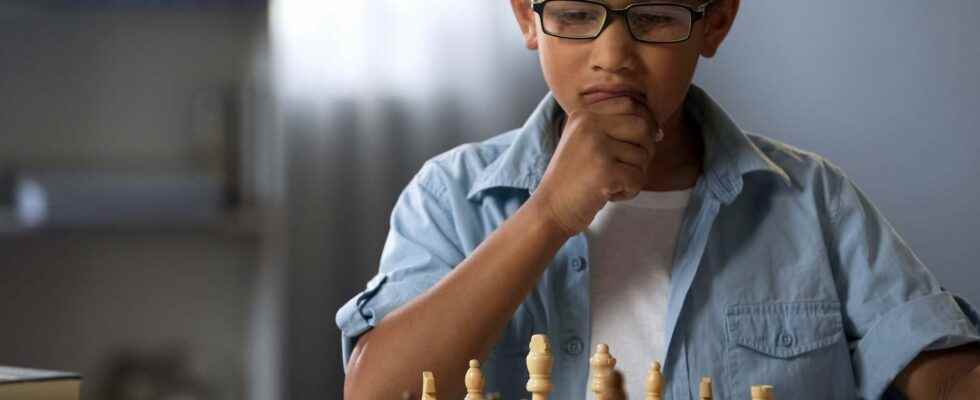You will also be interested
[EN VIDÉO] “Children’s brains, infinite potential?” », a documentary by Jupiter Films Neuroscientists working in the United States present their thesis on the education of children. According to them, it is necessary to let their emotions express themselves, which are very different from those of adults since their brain is not yet fully structured. These theorists are promoters of mindfulness meditation, the practice of which they advocate for children. This is what the documentary “Children’s brains, infinite potential?” shows us. », broadcast in France by Jupiter Films.
Everyone wants their children to succeed at school and all strategies are good to try to maximize their chances. In the collective imagination, the game of chess would make children more smartbest in math or in logic. This intuition is not without foundation. Chess is a game that researchers classify as a cognitive game, that is, it requires a major cognitive effort from the participants. To be good at chess, it is necessary to develop skills such as concentration and attention but also to acquire skills such as logical reasoning, calculation and movement pieces in mental space. Moreover, several studies suggest that the game of chess could have such virtues. Problem: they are biased. A more methodologically robust study conducted in England suggests that knowing how to play chess does not improve specific abilities or skills outside of chess. In essence, this suggests that the transfer of skills from chess to the school environment is not working.
The problem with previous studies
In its preamble, an English study recalls the limits of the studies which have been carried out in the past and which have contributed to the construction of the myth. First, most research reports associations between playing chess and academic skills. These observational studies are plagued by the influence of confounding factors but also of reverse causality bias. In other words, we cannot say if it is specifically failures that improve academic abilities, because another factor could be associated with a good level of failure and high academic skills (typically the socio-economic level), or if it could be the high academic skills that make a child better at chess. Second, most studies have been conducted with very small sample sizes that do not allow statistical differences between groups to be properly detected.
Finally, the studies are generally conducted in an experimental context, with tests carried out at the end of the experiment, which is totally different from an educational environment and reduces the external validity of the studies. For all these reasons, the researchers consider it necessary to carry out a randomized trial on a large scale, with a sufficiently robust sample, in the classroom environment and using standard educational tests as a judgment criterion one year after the intervention.
Playing chess does not improve school results
The study is categorical. Neither the results in mathematics, in reading or even in science are improved by learning to play chess. How to explain that the latter comes against most of the previous results? The researchers suggest several possible explanations. The first relates to sample size. In fact, the fewer people you include in a study, the more you are likely to observe strong variations, which will bias indicators such as the mean and the standard deviation, which are crucial for determining whether an effect exists. Therefore, the earlier results were probably false positives or again a type 2 error in statistical jargon.
The second relates to the temporality of the judgment criterion measured. As we have seen, in previous studies, the test is done just after the intervention, while here we look at the effect on the evaluations one year after the intervention. Also, the researchers’ study focused mainly on students educated in establishments with a significant number of disadvantaged students, which may explain the results and reinforces the idea that the socio-economic variable plays a role. major in the link highlighted by the old studies.
What conclusions can be drawn ?
Even though playing chess probably won’t improve your child’s academic performance, that’s no reason not to introduce them to the practice. Indeed, other parameters can potentially be favored by playing chess. Also, the pleasure we take in playing, like the social relations we weave within a club, can turn out positive on your child’s development. Therefore, if your child likes the game of chess and takes pleasure in playing it, encourage him in his practice without expecting a paradigm shift concerning these school results.
What you must remember
- Previous studies tainted with methodological biases suggest that playing chess could improve children’s academic results.
- A more robust English study from 2017 contradicts these results. It was probably false positives.
- Even if the game of chess does not improve school results, the pleasure that one takes in playing can have positive repercussions on the development of the child, just like the social bonds that one creates by this means. .
Reading ideas for the summer with Futura?
To celebrate the start of the holidays, we offer you the Mag Futura at the preferential price of 15 € instead of 19 €, i.e. a reduction of 20% !
What is Mag Futura?
- Our first paper journal of more than 200 pages to make science accessible to as many people as possible
- 4 major scientific questions for 2022, from the Earth to the Moon
- Home delivery*
*Special offer valid until July 19. Delivery is made in France (excluding metropolitan France), Switzerland, Belgium.
Interested in what you just read?
